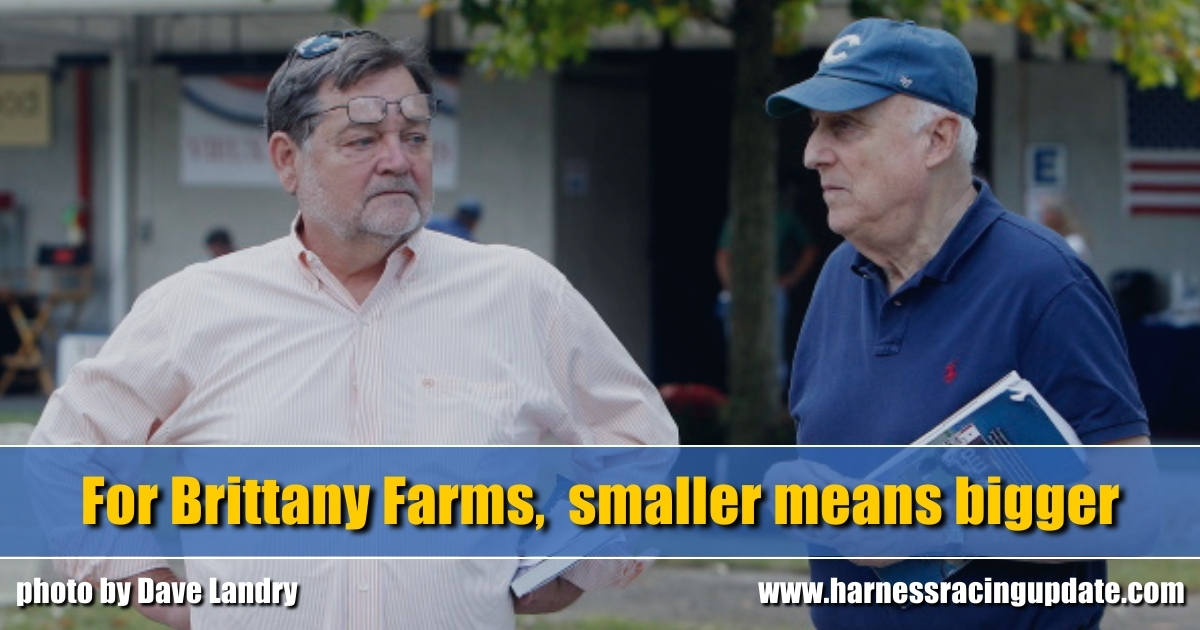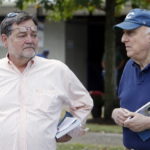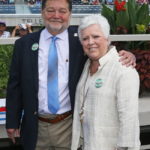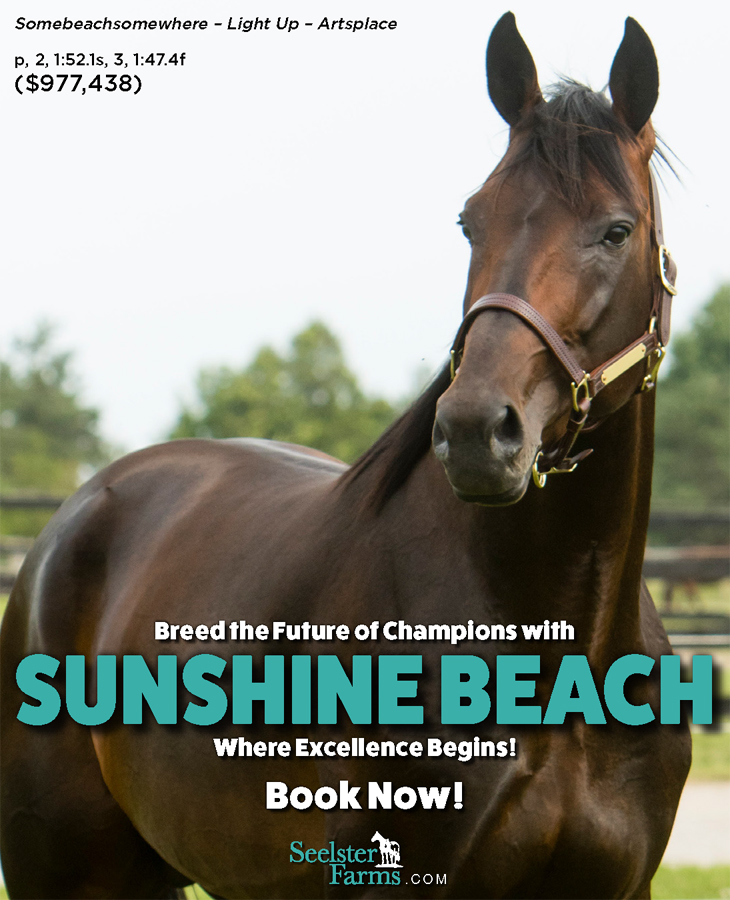
For Brittany Farms, smaller means bigger
The famed Kentucky farm scored its second straight Breeder of the Year award despite downsizing significantly five years ago.
by Dave Briggs
Art Zubrod prefers to look forward, not wallow in past glory, but he can’t hide his pride about the fact Brittany Farms has celebrated back-to-back Dan Patch Breeder of the Year awards after the famed Kentucky farm downsized significantly about five years ago.
Zubrod, Brittany’s only general manager since it was founded by owner George Segal in 1983, said continuing to produce champions such as Dan Patch winners Perfect Sting, Bettors Wish and Manchego, despite fewer mares and fewer acres, “has been thrilling.
“It means a lot to my wife (Leah Cheverie) and I, and George and everybody here at the farm,” Zubrod said of the Breeder of the Year title, the farm’s fourth to go with ones it earned in 2019, 2006 and 1996. “It validates what you’ve been doing all your life.”
In 2016, Brittany sold some 850 acres of the 1,000 acres that comprised its original farm in Versailles, KY and moved down the road to a new 121-acre site and retooled.
“We downsized for many reasons,” Zubrod said. “We found a nice farm and we just continued our program. We kept the right mares, but we’re still trying to improve our broodmare band. We’re not quitting, we’re looking at Perfect Sting as our next stallion.”
In 2020, Brittany was third among breeders with its progeny earning over $5.5 million. Brittany also tied Hanover Shoe Farms for producing the most Breeders Crown winners (27) in history.
In 2021, Brittany is poised to be just the third breeder — behind Hanover and Winbak Farms — to top $200 million in total progeny earnings.
This from an operation that now sports just 39 mares.
“When we made the decision to sell the old farm, which it took us four years to do that, we were over 100 (mares) and by the time we sold the farm we were low to mid 60s, 62 or 63. Our broodmare band is always in flux. We always have fillies coming off the racetrack and we have to downsize and we’re at 39 right now,” Zubrod said.
The secret to Brittany’s continued success — beyond making judicious decisions in retaining mares and breeding them to the right stallions — may just be in the soil at the new farm, Zubrod said.
“The geology of this place is incredible. I thought it was, but until I’d spent a couple of years here I wasn’t sure. If you read the history of Kentucky and raising horses, water is important. I think that means there’s either water going through your farm or around your farm. You really need your farm to have access to water. Not drinking water, because those days are gone, but I believe the water that’s around your farm helps the limestone to come up through the soil. We’re very, very shallow here and there’s no clay on this farm or we have not found any clay, it’s all top soil. A lot of places on the farm are two, three feet deep and when you get a little bit of a drought, it’ll brown up real fast here, faster than other places, but there’s so many springs and so much water surrounding us that, with just a half inch of rain, it looks like Ireland again. I think that’s an advantage that we have here.”
Another advantage is a farm small enough to easily keep tabs on all the horses.
“You can pretty well see everything from either my house or the office. There’s hardly any field that you can’t see,” Zubrod said.
Also, the new Brittany Farms has proven particularly effective in allowing horses to reach their potential, Zubrod said.
“We’ve got six or seven in each field and two guys in charge of that, that are very comfortable. They are very relaxed and I think that’s a big portion… certainly, pedigree and whatnot is important, but our horses seem to be so relaxed. Nothing bothers them.
“Over the hill from us, they hunt a lot. Some Saturdays, it’s just non-stop explosions of those shotgun shells and these horses don’t even lift their head up from eating.”
As for 2021, Zubrod and the Brittany team are excited about the sophomore prospects of Perfect Sting, who was, fittingly, perfect in 10 starts as a 2-year-old before being turned out at Brittany last fall.
“(Trainer Joe Holloway) sent him here to turnout after the season, and he’s the soundest horse I’ve ever gotten back from the racetrack. This horse didn’t have anything, nothing, I could work on,” Zubrod said.
“I’ve been doing this for close to 50 years and this is the most professional horse that I’ve ever been around in my life. It was so exciting for Leah and myself to have this horse here. He does nothing wrong; he takes care of himself. He exercised and he’s good with people. He did make a buddy with a trotter we have here, a horse named Ethics that Julie Miller is going to train as a 3-year-old. They were buddies and they’d be fun to watch. Over the fence, they’d try to get each other going. They both have got a lot of personality. One would ignore the other one and that would make the other one really mad, so it’s been a lot of fun with him.
“He’s an absolutely gorgeous horse.”
At age 6, Manchego is back in training with Nancy Takter. Bettors Wish is beginning his stallion career at Diamond Creek Farm of Pennsylvania.
“He’s a really neat horse with a lot of personality. He seemed to be a very sound horse, too, so hopefully he can pass that on,” Zubrod said of Bettors Wish, owned, in part, by Zubrod and Cheverie’s Fair Island Farm Inc. (the Breeder of the Year in 2002).
Then there are the new crop of Brittany 2-year-olds which Zubrod hopes will prove to have its share of champions.
“I’m excited about my yearlings, excited about the foals coming, excited about the ones I’m going to breed,” he said.
The decision to downsize Brittany is, in large part, because Segal — who was also Breeder of the Year in 1992 with late horse partner Brian Monieson — has no apparent heirs in his family willing to continue on with the horses. At age 82, Segal is slowly winding down the operation.
But when the day finally comes to close down one of harness racing’s greatest breeding operations, Segal, Zubrod, Cheverie and the rest of the Brittany team are determined to go out on top.
“We all know this is going to come to an end, probably sooner than later when you look at being here over 30 years, but I think we’re all going to go out having some fun,” Zubrod said.















